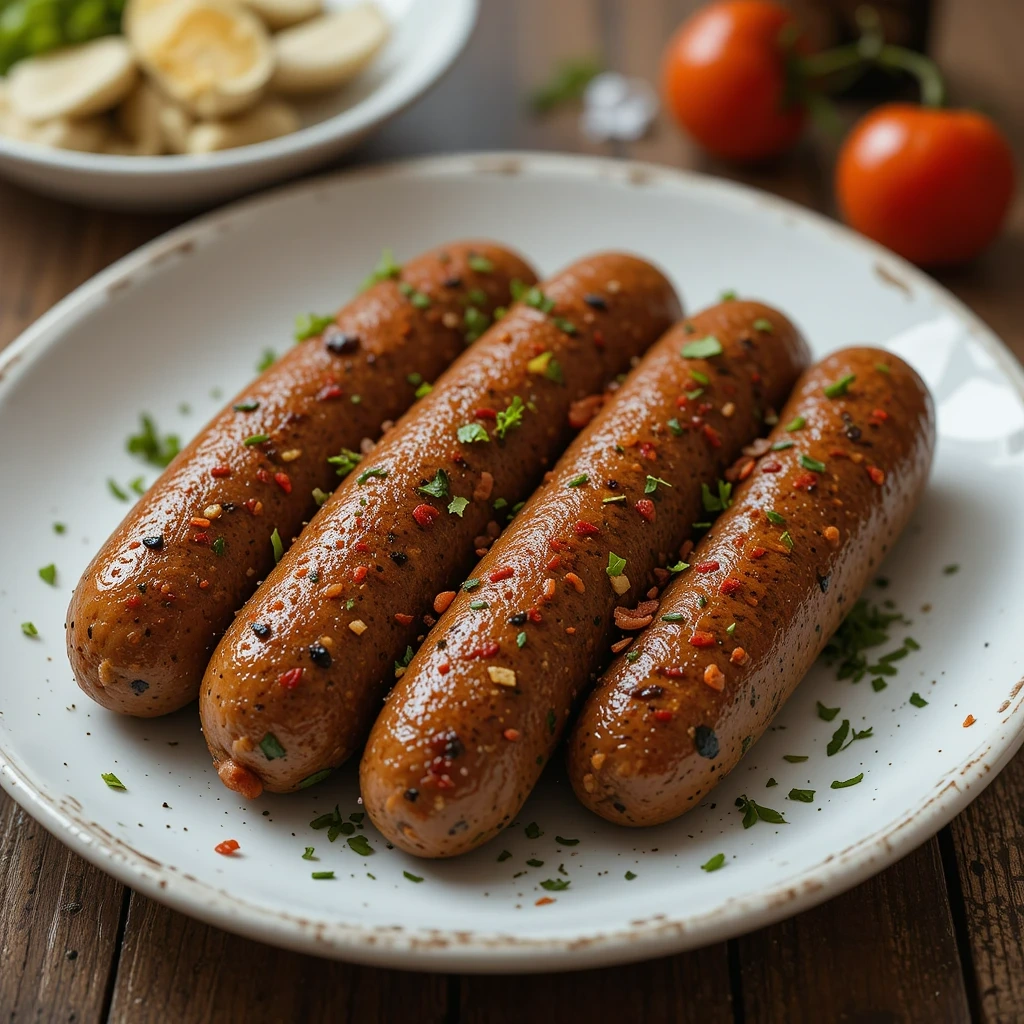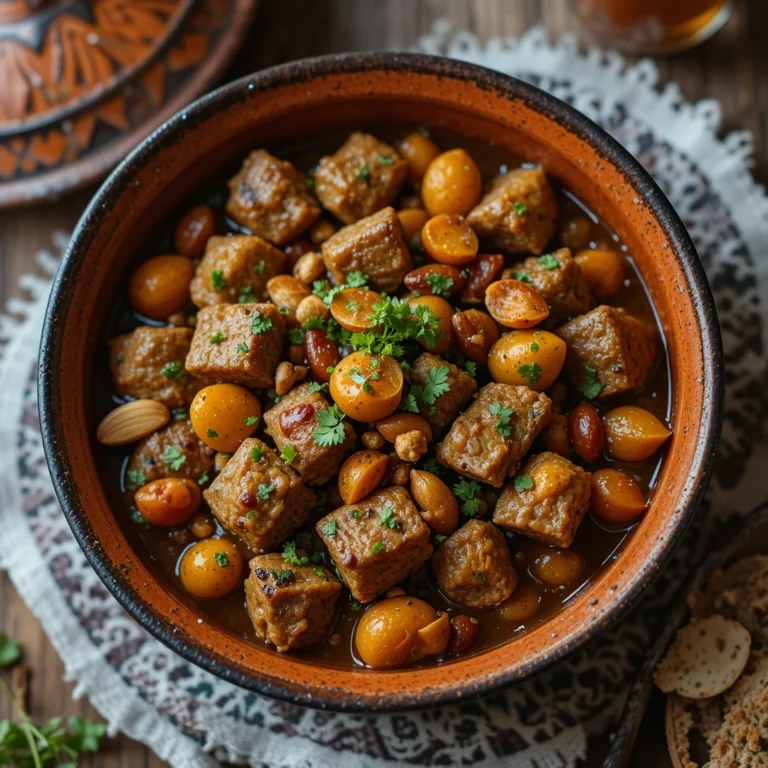Camel meat isn’t something you’ll find on every dinner table—but maybe it should be. The first time I tried it, I wasn’t sure what to expect. It was a slow-cooked stew, gently simmered with warm spices, chickpeas, and tomatoes. The meat was tender, almost buttery, and surprisingly mild—more delicate than beef, richer than chicken, and completely delicious. That meal stayed with me, not just for its flavor, but for the curiosity it sparked about this underappreciated red meat.
Long a staple in Middle Eastern, African, and Asian cuisines, camel meat is now gaining recognition worldwide for its nutritional benefits and sustainability. It’s packed with high-quality protein, low in fat, and rich in iron, zinc, and B vitamins. For health-conscious eaters and culinary adventurers alike, it’s a flavorful, leaner alternative to beef and lamb.
In this article, we’ll explore camel meat’s cultural roots, its nutritional highlights, and the best ways to prepare it—from juicy grilled skewers to hearty stews. Whether you’re discovering camel meat for the first time or looking to expand your cooking horizons, this guide will help you bring this ancient protein into your modern kitchen.
Table of Contents
Table of Contents
What Makes Camel Meat Unique?
Camel meat is nutritionally superior to most other red meats. Unlike beef or Camel meat is a standout among red meats, offering a unique combination of nutritional benefits, flavor, and sustainability. Nutritionally, it surpasses many other meats, with a remarkably low fat content of just 2-3%, compared to 15-20% in beef. This makes it an excellent lean protein option for health-conscious individuals. Additionally, camel meat is rich in essential minerals like iron and zinc, which are crucial for maintaining energy levels, supporting the immune system, and promoting muscle recovery. For anemics, athletes, or anyone looking to boost their nutrient intake, camel meat is a powerhouse choice.
In terms of flavor, camel meat has a mild, slightly sweet taste that sets it apart from the stronger, gamier flavors of goat or venison. This makes it more versatile and appealing to a wider audience, especially those trying it for the first time. Its tender texture, when cooked properly, lends itself well to a variety of dishes, from grilling and roasting to slow-cooked stews.
What truly makes camel meat unique is its sustainability. Camels are incredibly resilient animals, thriving in harsh, arid environments where other livestock struggle. They require minimal water and can graze on sparse vegetation, making them a far more eco-friendly option compared to water-intensive cattle farming. As the world grapples with climate change and resource scarcity, camel meat offers a sustainable protein source that aligns with the growing demand for environmentally conscious food choices.
In summary, camel meat is not only a nutrient-rich, delicious alternative to traditional red meats but also a forward-thinking solution for a more sustainable future. Its unique qualities make it a valuable addition to any diet, offering both health benefits and a smaller environmental footprint.
If you’re interested in other lean meat options, check out our guide on goat meat for another high-protein alternative.
Nutritional Value of Camel Meat
Camel meat is nutrient-dense, offering a perfect balance of protein, vitamins, and minerals.
Macronutrients Per 100g Serving:
| Nutrient | Amount |
|---|---|
| Protein | 20-23g |
| Fat | 1.1-10g |
| Cholesterol | 57.5 mg |
| Iron | 45.5 mg |
| Water | 75-78% |
Key Benefits Over Other Meats:
✅ Higher protein content than beef, chicken, or lamb.
✅ Lower saturated fats, making it heart-friendly.
✅ Rich in omega-3 fatty acids, essential for brain function.
Looking for another high-protein meal option? Try our high-protein lunch ideas for lean and nutritious meals.

Health Benefits of Camel Meat
Camel meat is not just a protein powerhouse—it’s also packed with essential nutrients that promote overall health and well-being.
1. Promotes Heart Health ❤️
Camel meat contains low cholesterol levels, which help reduce the risk of heart disease. Unlike beef, it has less saturated fat, making it a heart-friendly option. Additionally, it is rich in omega-3 fatty acids, which support cardiovascular function, lower blood pressure, and reduce inflammation in arteries.
2. Supports Weight Management 🏋️♂️
For those following a weight loss diet, camel meat is an excellent choice. It is low in fat, making it leaner than beef and lamb. Its high protein content increases satiety, helping you feel full for longer, reducing the urge to snack between meals.
3. Boosts Iron Levels 🔋
Camel meat is an iron-rich food, which helps prevent anemia and improves red blood cell production. This makes it especially beneficial for pregnant women, athletes, and individuals with low iron levels.
4. Strengthens the Immune System 🛡️
Packed with zinc and selenium, camel meat enhances immune function and helps the body fight infections. It also contains carnosine and powerful antioxidants, which help reduce inflammation and oxidative stress.
5. Aids Digestion & Gut Health 🌱
Unlike some red meats, camel meat is easy to digest due to its unique protein composition. It contains bioactive peptides, which support gut health by promoting beneficial gut bacteria and improving digestion.
If you’re looking for lean meats for meal prep, try our chicken breakfast recipes for quick, protein-packed breakfasts!
How to Cook Camel Meat (Best Methods & Tips)
Camel meat is leaner than beef, meaning it requires slow cooking or moist cooking techniques to keep it tender.
Best Cooking Techniques:
🔥 Slow Cooking: Ideal for stews and curries.
🍖 Grilling & Roasting: Works well for hump meat (rich in fat).
🍲 Braising: Perfect for tougher cuts like shank and ribs.
🥩 Marination: Yogurt, lemon juice, and garlic help tenderize the meat.
✅ Cooking Tip: Marinate camel meat overnight for extra tenderness and flavor infusion!
Need a delicious slow-cooker meal? Try our beef slow cooker recipes—many can be adapted for camel meat!

Best Camel Meat Recipes
1. Camel Meat Stew (Madfoon) 🥘🔥
A rich and aromatic slow-cooked camel meat stew with spices, rice, and vegetables.
Ingredients:
- 1 kg camel meat (cubed)
- 2 tbsp olive oil
- 1 large onion (chopped)
- 3 cloves garlic (minced)
- 2 large tomatoes (chopped)
- 2 carrots (sliced)
- 1 red bell pepper (chopped)
- 1 tsp cumin
- 1 tsp coriander
- 1 tsp paprika
- 1/2 tsp cinnamon
- 1 tsp black pepper
- 1 tsp salt
- 4 cups beef or vegetable broth
- 1 cup basmati rice
Instructions:
- Heat olive oil in a large pot over medium heat. Add onions and garlic, sauté until golden brown.
- Add camel meat and sear on all sides until browned.
- Stir in tomatoes, carrots, and bell peppers. Cook for 5 minutes.
- Add all the spices and mix well to coat the meat and vegetables.
- Pour in broth and bring to a boil. Reduce heat, cover, and simmer for 2-3 hours until the meat is tender.
- In a separate pot, cook basmati rice according to package instructions.
- Serve the stew over rice and garnish with fresh parsley or coriander.
2. Spiced Camel Sausage (Soudjouk) 🌶️🥩
A Middle Eastern-style sausage, seasoned with bold spices, perfect for grilling or frying.
Ingredients:
- 500g ground camel meat
- 1 tbsp olive oil
- 1 tsp salt
- 1 tsp black pepper
- 1 tsp paprika
- 1/2 tsp chili flakes
- 1 tsp cumin
- 1 tsp garlic powder
- 1/2 tsp cinnamon
- 1 tbsp vinegar
- 1/4 cup cold water
- 1 natural sausage casing (optional)
Instructions:
- In a large bowl, mix camel meat with spices, vinegar, and cold water.
- Knead the mixture well and let it rest in the refrigerator for 1-2 hours.
- If using sausage casing, rinse and soak in water for 30 minutes.
- Stuff the camel sausage mixture into the casing or shape it into small patties.
- Heat olive oil in a pan and cook the sausages over medium heat for 10-12 minutes, turning occasionally until golden brown.
- Serve with flatbread, hummus, or a fresh salad.
3. Moroccan Camel Tagine 🍲🌿
A flavorful slow-cooked dish with spices, dried fruits, and nuts.
Ingredients:
- 800g camel meat (cubed)
- 2 tbsp olive oil
- 1 large onion (chopped)
- 2 cloves garlic (minced)
- 1 tbsp ginger powder
- 1 tsp turmeric
- 1 tsp cinnamon
- 1 tsp paprika
- 1/2 tsp saffron threads (optional)
- 1 tsp salt
- 1/2 tsp black pepper
- 2 tbsp honey
- 1/2 cup dried apricots (chopped)
- 1/4 cup almonds (toasted)
- 3 cups chicken or beef broth
- 1 tbsp lemon juice
- 1 tbsp fresh coriander (chopped)
Instructions:
- Heat olive oil in a tagine pot or deep pan over medium heat.
- Add onions and garlic, sauté until soft.
- Add camel meat, sear on all sides until browned.
- Stir in ginger, turmeric, cinnamon, paprika, saffron, salt, and black pepper.
- Pour in broth and bring to a simmer. Cover and cook on low heat for 2-3 hours.
- Stir in honey, apricots, and almonds, cook for another 15 minutes.
- Finish with a squeeze of lemon juice and a sprinkle of fresh coriander.
- Serve with couscous or warm bread.
4. Camel Meat Burgers 🍔🔥
A juicy and lean alternative to beef burgers, packed with flavor and protein.
Ingredients:
- 500g ground camel meat
- 1/2 cup breadcrumbs
- 1 egg
- 1 tsp garlic powder
- 1 tsp onion powder
- 1/2 tsp cumin
- 1/2 tsp black pepper
- 1 tsp paprika
- 1/2 tsp salt
- 1 tbsp Worcestershire sauce
- 1 tbsp olive oil
- 4 burger buns
- 4 slices cheese (optional)
- Lettuce, tomato, and onions for topping
Instructions:
Serve hot with fries or a side salad.
In a bowl, mix camel meat, breadcrumbs, egg, and spices.
Add Worcestershire sauce and mix until well combined.
Shape into 4 burger patties and refrigerate for 30 minutes.
Heat olive oil in a pan or grill. Cook burgers for 4-5 minutes per side until golden brown.
Toast the burger buns and place a slice of cheese on the patties if desired.
Assemble with lettuce, tomato, onions, and your favorite sauces.
Looking for more unique recipes? Check out our ground sausage recipes for flavorful meal ideas!
Camel Meat vs. Beef: Which One is Better?
| Feature | Camel Meat | Beef |
|---|---|---|
| Protein | High | High |
| Fat Content | Low | High |
| Cholesterol | Low | High |
| Iron | Higher | Lower |
| Environmental Impact | Lower | Higher |
Camel meat is a leaner, healthier, and more sustainable alternative to beef.
For other sustainable meat choices, check out our organic meat guide!
Where to Buy Camel Meat & Storage Tips
✅ Available at Middle Eastern & African markets.
✅ Online specialty meat retailers ship globally.
✅ Halal butcher shops in the US, UK, and Australia.
Storage Tips:
- Refrigerate: Up to 3 days.
- Freeze: Up to 6 months in an airtight bag.
Frequently Asked Questions (FAQ)
1. Is camel meat halal?
Yes, camel meat is halal according to Islamic dietary laws.
2. What does camel meat taste like?
It has a mild, slightly sweet flavor, with a leaner texture than beef.
3. Can camel meat be used for burgers and steaks?
Yes! Camel meat burgers are juicy and flavorful.
4. Where can I buy camel meat online?
Try specialty halal butchers and exotic meat stores.
Final Thoughts: Should You Try Camel Meat?
Absolutely! With its incredible nutrition, unique taste, and sustainability benefits, camel meat is a great alternative to beef. Whether you’re a fitness enthusiast, foodie, or health-conscious eater, camel meat offers an exciting and nutritious option for your diet.
Looking for more delicious meal ideas? Explore our quick dinner ideas for easy, tasty recipes!
Would you try camel meat? Let us know in the comments! 🍽️🐪🔥

